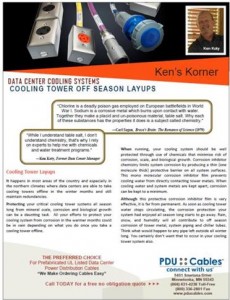KEN'S KORNER - Cooling Tower Off Season Layup
Cooling Tower Off Season Layup
“Chlorine is a deadly poison gas employed on European battlefields in World War I. Sodium is a corrosive metal which burns upon contact with water. Together they make a placid and un-poisonous material, table salt. Why each of these substances has the properties it does is a subject called chemistry.”
---Carl Sagan, Broca's Brain: The Romance of Science (1979),
While I understand table salt, I don’t understand chemistry, that’s why I rely on the experts to help me do my job…experts like Fremont Industries, water management solutions.
It happens in most areas of the country and especially in the northern climates where data centers are able to take cooling towers offline in the winter months and still maintain redundancies.
Protecting your critical cooling tower systems all season long from mineral scale, corrosion and biological growth can be a daunting task. Did you know that all your efforts to protect your system from corrosion in the warmer months could be in vain depending on what you do once you take a cooling tower off-line.
That’s right. Let me explain why.
When running, your cooling system should be well protected through use of chemicals that minimize risk of corrosion, scale, and biological growth. Corrosion inhibitor chemistry limits system corrosion by producing a thin (one molecule thick) protective barrier on all system surfaces. This mono molecular corrosion inhibitor film prevents cooling water from directly contacting tower metals. When cooling water and system metals are kept apart, corrosion can be kept to a minimum.
Although this protective corrosion inhibitor film is very effective, it is far from permanent. As soon as cooling tower water stops circulating, the corrosion protection your system had enjoyed all season long starts to go away. Rain, snow, and humidity will all contribute to off season corrosion of tower metal, system piping and chiller tubes. Think what would happen to any pipe left outside all winter long. You certainly don’t want that to occur in your cooling tower system also.
In order to minimize risk of off season corrosion, the following steps should be considered before taking your tower offline for the season.
- The cooling tower should be treated with an appropriate, broad spectrum, non-oxidizing micro biocide fed at the maximum permissible slug dose concentration. Maintain the treatment residuals for 24 hours to make sure that those troublesome, corrosion and disease causing micro-organisms are minimized. (See the article on The Dangers of Bacteria in a Data Center Cooling System)
- Drain and flush the cooling tower system. Make an effort to remove all mud, sludge, silt and dirt from the system. Any debris left in the tower system/basin provides areas that are very susceptible to a phenomenon known as “under deposit corrosion”. This condition will often lead to localized areas of very severe corrosion. Once the tower is clean, refill the system with fresh water.
- Tower layup treatment should be added and allowed to circulate per the direction of your water treatment provider. (Effective layup chemistry will remove both organic and iron oxide deposits, promote passivation of system metallurgies, and produce an effective and tenacious thin film barrier that will provide system corrosion protection all winter long)
- Drain the cooling system and allowed to dry. All drain and bleed valves should be allowed to remain open to promote drainage during off season layup.
Descriptions and words are fine but if you’re like me, there’s nothing like a picture to illustrate a point. Below is a photo of laboratory test panels. The clean panels were treated with layup chemistry. The rusty panels were not.

Over the years I’ve discovered that there are many companies that produce high quality chemistries for protection of your critical cooling system equipment. The key to an effective program isn’t the name on the drum but the name of your representative. Make sure to find a person you can trust, is knowledgeable, and can work well with your staff.
Why have a well controlled chemical treatment program all year, only to let winter corrosion occur due to an inadequate off season layup procedure. Proper chemical treatment of your cooling system during layup will prevent corrosion and make for a smoother, more trouble free start up the following spring.
Ken Koty
P.S. I’d like to thank our friends at Fremont Industries, for their help in creating this article and supplying the photograph above.

